上海细胞库
人源细胞系| 稳转细胞系| 基因敲除株| 基因点突变细胞株| 基因过表达细胞株| 重组细胞系| 猪的细胞系| 马细胞系| 兔的细胞系| 犬的细胞系| 山羊的细胞系| 鱼的细胞系| 猴的细胞系| 仓鼠的细胞系| 狗的细胞系| 牛的细胞| 大鼠细胞系| 小鼠细胞系| 其他细胞系|

| 规格 | 价格 | 库存 |
|---|---|---|
| 50ul | ¥ 980 | 200 |
| 100ul | ¥ 1680 | 200 |
| 200ul | ¥ 2500 | 200 |
| 中文名称 | 葡萄糖转运蛋白1抗体 |
| 别 名 | Glucose Transporter GLUT1; GT-1; GLUT-1; GLUT 1; Solute carrier family 2; facilitated glucose transporter member 1; Glucose transporter type 1; erythrocyte/brain; DYT17; DYT18; Erythrocyte/brain HepG2 glucose transporter; Erythrocyte/hepatoma glucose transporter; Glucose transporter 1; Glucose transporter type 1; Glucose transporter type 1 erythrocyte/brain; Glucose transporter type 1, erythrocyte/brain; GLUT; GLUT1; GLUT1DS; GLUTB; GT1; GTG1; Gtg3; GTR1_HUMAN; HepG2 glucose transporter; MGC141895; MGC141896; PED; RATGTG1; SLC2A 1; SLC2A1; Solute carrier family 2 (facilitated glucose transporter), member 1; Solute carrier family 2 facilitated glucose transporter member 1. |
| 研究领域 | 肿瘤 免疫学 生长因子和激素 转运蛋白 |
| 抗体来源 | Rabbit |
| 克隆类型 | Polyclonal |
| 交叉反应 | Human, Mouse, Rat, (predicted: Chicken, Dog, Pig, Cow, Sheep, ) |
| 产品应用 | WB=1:500-2000 ELISA=1:500-1000 IHC-P=1:100-500 IHC-F=1:100-500 Flow-Cyt=1μg/Test ICC=1:100-500 IF=1:100-500 (石蜡切片需做抗原修复) not yet tested in other applications. optimal dilutions/concentrations should be determined by the end user. |
| 分 子 量 | 54kDa |
| 细胞定位 | 细胞膜 细胞外基质 |
| 性 状 | Liquid |
| 浓 度 | 1mg/ml |
| 免 疫 原 | KLH conjugated synthetic peptide derived from human GLUT1:191-270/492 |
| 亚 型 | IgG |
| 纯化方法 | affinity purified by Protein A |
| 储 存 液 | 0.01M TBS(pH7.4) with 1% BSA, 0.03% Proclin300 and 50% Glycerol. |
| 保存条件 | Shipped at 4℃. Store at -20 °C for one year. Avoid repeated freeze/thaw cycles. |
| PubMed | PubMed |
| 产品介绍 | This gene encodes a major glucose transporter in the mammalian blood-brain barrier. Mutations in this gene have been found in a family with paroxysmal exertion-induced dyskinesia. [provided by RefSeq, Jul 2008]. Function: Facilitative glucose transporter. This isoform may be responsible for constitutive or basal glucose uptake. Has a very broad substrate specificity; can transport a wide range of aldoses including both pentoses and hexoses. Subcellular Location: Cell membrane; Multi-pass membrane protein. Melanosome. Note=Localizes primarily at the cell surface. Identified by mass spectrometry in melanosome fractions from stage I to stage IV. Tissue Specificity: Expressed at variable levels in many human tissues. Post-translational modifications: Phosphorylated upon DNA damage, probably by ATM or ATR. DISEASE: Defects in SLC2A1 are the cause of GLUT1 deficiency syndrome type 1 (GLUT1DS1) [MIM:606777]; also known as blood-brain barrier glucose transport defect. A neurologic disorder showing wide phenotypic variability. The most severe 'classic' phenotype comprises infantile-onset epileptic encephalopathy associated with delayed development, acquired microcephaly, motor incoordination, and spasticity. Onset of seizures, usually characterized by apneic episodes, staring spells, and episodic eye movements, occurs within the first 4 months of life. Other paroxysmal findings include intermittent ataxia, confusion, lethargy, sleep disturbance, and headache. Varying degrees of cognitive impairment can occur, ranging from learning disabilities to severe mental retardation. Defects in SLC2A1 are the cause of GLUT1 deficiency syndrome type 2 (GLUT1DS2) [MIM:612126]. A clinically variable disorder characterized primarily by onset in childhood of paroxysmal exercise-induced dyskinesia. The dyskinesia involves transient abnormal involuntary movements, such as dystonia and choreoathetosis, induced by exercise or exertion, and affecting the exercised limbs. Some patients may also have epilepsy, most commonly childhood absence epilepsy. Mild mental retardation may also occur. In some patients involuntary exertion-induced dystonic, choreoathetotic, and ballistic movements may be associated with macrocytic hemolytic anemia. Similarity: Belongs to the major facilitator superfamily. Sugar transporter (TC 2.A.1.1) family. Glucose transporter subfamily. SWISS: P11166 Gene ID: 6513 Database links: Entrez Gene: 6513 Human Entrez Gene: 20525 Mouse Entrez Gene: 24778 Rat Omim: 138140 Human SwissProt: P11166 Human SwissProt: P17809 Mouse SwissProt: P11167 Rat Unigene: 473721 Human Unigene: 721551 Human Unigene: 21002 Mouse Unigene: 3205 Rat Important Note: This product as supplied is intended for research use only, not for use in human, therapeutic or diagnostic applications. |
| 产品图片 | 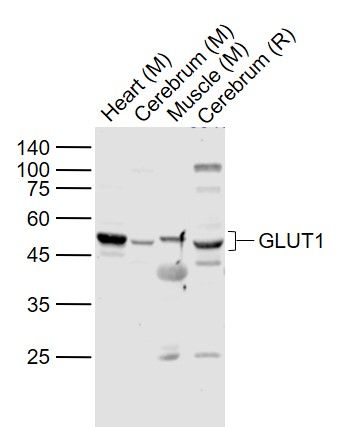 Sample: Sample:Lane 1: Heart (Mouse) Lysate at 40 ug Lane 2: Cerebrum (Mouse) Lysate at 40 ug Lane 3: Muscle (Mouse) Lysate at 40 ug Lane 4: Cerebrum (Rat) Lysate at 40 ug Primary: Anti-GLUT1 (bs-0472R) at 1/1000 dilution Secondary: IRDye800CW Goat Anti-Rabbit IgG at 1/20000 dilution Predicted band size: 45-60 kD Observed band size: 48 kD 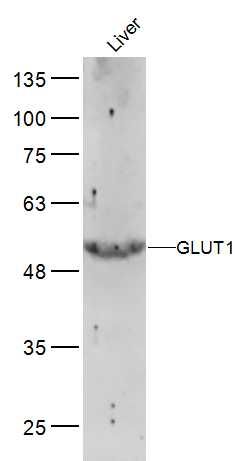 Sample: Sample:Liver (Rat) Lysate at 40 ug Primary: Anti-GLUT1 (bs-0472R) at 1/300 dilution Secondary: IRDye800CW Goat Anti-Rabbit IgG at 1/20000 dilution Predicted band size: 54 kD Observed band size: 54 kD 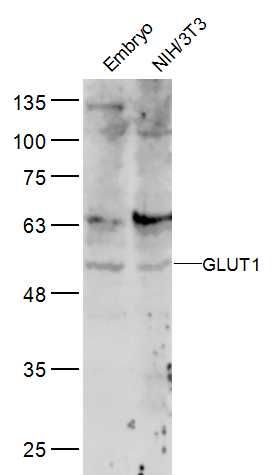 Sample: Sample:Embryo(Mouse) Lysate at 40 ug NIH/3T3(Mouse) CellLysate at 30 ug Primary: Anti-GLUT1 (bs-0472R) at 1/300 dilution Secondary: IRDye800CW Goat Anti-Rabbit IgG at 1/20000 dilution Predicted band size: 54 kD Observed band size: 54 kD 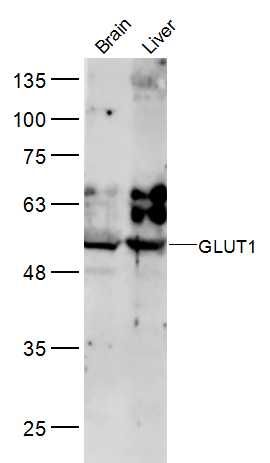 Sample: Sample:Brain(Mouse) Lysate at 40 ug Liver(Mouse) Lysate at 40 ug Primary: Anti-GLUT1 (bs-0472R) at 1/300 dilution Secondary: IRDye800CW Goat Anti-Rabbit IgG at 1/20000 dilution Predicted band size: 54 kD Observed band size: 54 kD 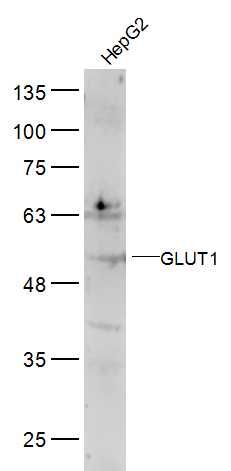 Sample: Sample:HepG2 (Human) CellLysate at 30 ug Primary: Anti-GLUT1 (bs-0472R) at 1/300 dilution Secondary: IRDye800CW Goat Anti-Rabbit IgG at 1/20000 dilution Predicted band size: 54 kD Observed band size: 54 kD 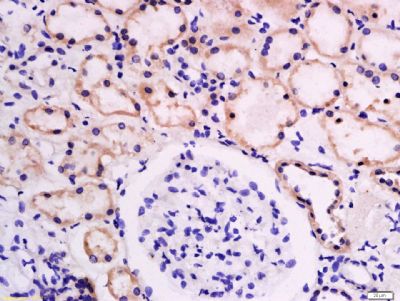 Tissue/cell: human kidney tissue; 4% Paraformaldehyde-fixed and paraffin-embedded; Tissue/cell: human kidney tissue; 4% Paraformaldehyde-fixed and paraffin-embedded;Antigen retrieval: citrate buffer ( 0.01M, pH 6.0 ), Boiling bathing for 15min; Block endogenous peroxidase by 3% Hydrogen peroxide for 30min; Blocking buffer (normal goat serum,C-0005) at 37℃ for 20 min; Incubation: Anti-GLUT1 Polyclonal Antibody, Unconjugated(bs-0472R) 1:400, overnight at 4°C, followed by conjugation to the secondary antibody(SP-0023) and DAB(C-0010) staining Image was kindly submitted by Dr. Lelisa Gemta from University of Virginia. Mouse splenocytes stained with Rabbit Anti-GLUT1 Polyclonal Antibody, PE conjugated (bs-0472R-PE)at 1:50. |